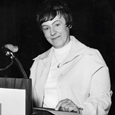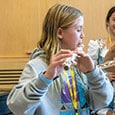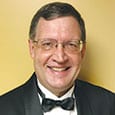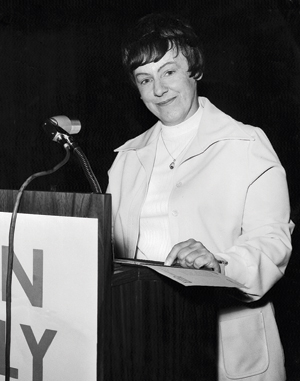
This December, the Midwest Clinic will celebrate its 70th anniversary. What began as a one-day reading session of band music at the Chicago YWCA gym on December 7, 1946, has grown to become the largest instrumental music education conference in the world. One of the greatest periods of growth in the Midwest Clinic’s history was from 1980-1997, during Barbara Buehlman’s tenure as Executive Administrator. Nearly everything about the Midwest increased under her watch, from the number of attendees to the variety of clinics offered. For most people, helping transform something like the Midwest would be the pinnacle of an entire career. For Buehlman, however, it was just one of the many different ways she had an impact on music education.
Barbara Buehlman was born in Chicago in 1936 and was a product of the public schools. Her band director at Lake View High School was Captain Louis D. Walz, a World War I veteran. In the 1930s, Walz was one of the first Chicago high school band directors to admit female students into band equally with males. Buehlman first played alto clarinet at Lake View, and was listed as the 1955 City Alto Clarinet Champion. During her sophomore year, she switched to French horn.
Walz was a role model to her; and she initially wanted to attend VanderCook College of Music, just as he had done. While she was an undergraduate, Walz invited Buehlman back to guest-conduct the high school band. The cost to attend VanderCook was prohibitive, though, and when Buehlman was offered a scholarship to attend Northwestern University, it became her destination.
While a student, Buehlman was a member of the Northwestern Band Staff. She was the only female staff member, and because of that, was frequently denied the same experience as her male colleagues. The band staff helped create the marching band’s field shows, but because band membership was restricted to male students at the time, Buehlman was excluded from the process. Buehlman did regularly attend marching rehearsals and observed from the sidelines, with the hope it would help prepare her to become a high school band director.
Much of the band staff’s work was done at night, and because Buehlman was the only female member, she was not allowed to stay in the music building after closing. Buehlman made sure her male peers knew how she felt about this, by loudly slamming the doors shut on her way out.
It was at Northwestern that Buehlman first began working with John Paynter. He had become Director of Bands in 1953, only two years before Buehlman’s first year. Paynter became a mentor to Buehlman, a role that continued throughout her career. It was Paynter who put Buehlman on the band staff, and it was from his example that she based her later, renowned organizational techniques.
Buehlman’s teaching career began in 1960, at Round Lake (Illinois) Grade School. In going there, she recalled Paynter’s advice: “Find yourself a community, and build yourself a kingdom.” Both the previous grade school and high school band directors had been male, and the principal who hired Buehlman joked with her that he might have to tell the school board he had hired “Bob Buehlman,” for fear they might not accept a female band director. It did not take long for Buehlman to produce bands of national renown. In 1965, the grade school band performed at the Midwest Clinic. They would perform there again in 1971.
James Croft, longtime Director of Bands at Florida State University, described Buehlman’s Round Lake ensemble as “a band that played with memorable sonority, well-crafted lines, and great sensitivity.” Buehlman’s students, for the most part, did not study privately. This was due to both Round Lake’s distance from the greater Chicago area, and the lower-income status of many local families. Virtually all instruction the students received came from the sectionals and lessons provided by the Round Lake directors. As a director, Buehlman was known for high expectations and a no-nonsense approach. A former student recalled apologizing with tears in her eyes that she had not practiced her instrument for a week. Another recalled how Buehlman made students play a part over and over, until it was perfect. Dan Perrino, who taught as part of the University of Illinois music extension, made numerous visits to Buehlman’s band room. He was struck by how serious the grade school students were when they entered, something he felt was unusual for that age.
Buehlman was particularly successful in mobilizing band parents in Round Lake. Booster meetings were typically held in conjunction with a band performance; this ensured there would be 300-400 band parents in attendance. The first time she combined a booster meeting with a concert was to bring in the neighboring Lake Villa grade school band. It was Buehlman’s intent to expose her parents to what a good band sounded like, and provide an example of what she was attempting to build. By 1980, Buehlman’s band boosters had raised over $450,000, which provided for two sets of band uniforms, scholarships to summer camps and all the expenses on every band trip. The band parents did more than raise money, though. They were a frequent presence at School Board meetings whenever the health of the band program was threatened. In 1978, the parents’ protest stopped a plan to eliminate two band director positions in the Round Lake schools.
By 1980, Buehlman had reached a point in her career where she was looking for new challenges. Opportunity came in the form of a job as Executive Administrator of the Midwest Clinic. This was initially a part-time position, which she did while continuing to teach in Round Lake. John Paynter was a member of the Midwest Clinic’s Board of Directors, and in 1982, when he was nominated for Board Presidency, he stipulated he would only accept the office if Buehlman’s position was made full-time.
Having honed her organizational abilities during her 22 years in Round Lake, Buehlman now had a new arena ito put them on full display. Midwest Board members recalled how smoothly meetings ran, and how quick Buehlman was to address any concerns. Though Buehlman’s background was in music education, she showed strong business acumen. When Buehlman joined the Midwest, the Clinic was not on firm financial standing. She addressed this in a multitude of ways: charging admission to the conference (which had been previously free); negotiating the contract with the hosting hotel, the Chicago Hilton; recruiting industry sponsorship; and expanding Midwest offerings
Buehlman’s no-nonsense reputation as a teacher carried over to her administrative work, where she was widely known for her rigid enforcement of Midwest policies and regulations. These applied to everyone, from clinicians to exhibitors, performers to attendees. The directors of the performing ensembles received letter after letter from Buehlman. They covered every aspect of the commitment, from the Midwest’s music policy to Chicago sightseeing possibilities.
While some found Buehlman demanding, many other conductors were appreciative of how her attention to detail allowed their performances to proceed without a hitch. Lewis J. Buckley, conductor of the U.S. Coast Guard Band wrote to Buehlman after their 1991 performance, “We were never in the dark about what had to be accomplished when, and that made our preparations easy.”
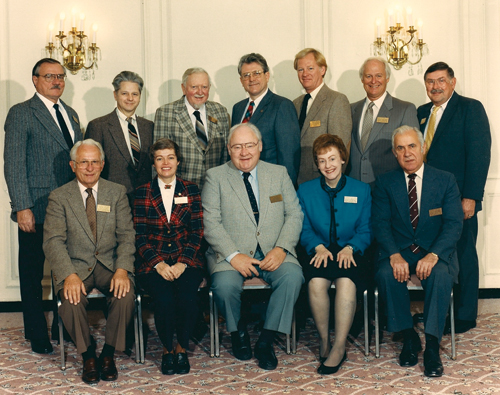
The Midwest Clinic Board of Directors in 1986. Front row (L-R): Richard E Brittain, Dorothy Kunkel, John P. Paynter, Barbara Buehlman, Harry Begian. Back row (L-R): Donald H. Lyons, Victor W. Zajec, Paul Yoder, David McCormick, J. Richard Dunscomb, Neil A. Kjos, Jr., Ziggy Coyle.
There was virtually no area of the Midwest that did not feel Buehlman’s influence. It was her idea in 1983 to offer clinics that emphasized chamber music. In 1988, she proposed offering college credit for Midwest attendance, through the University of Miami, something that continues to today. The College Night, another Buehlman idea, made its Midwest debut in 1988. A year later, a Teacher Resource Center was added. When concert overcrowding became a problem, Buehlman arranged for a closed-circuit television broadcast of the Wednesday service band performance. It was also her idea in 1997 to divide the Midwest concerts into two series, with attendees receiving a ticket package with their registration. The ticket system continued as Buehlman designed until the Midwest moved out of the Hilton.
Buehlman’s work with the Midwest Clinic was recognized in a few different ways. In 1995, she awarded the Midwest Clinic Medal of Honor, becoming only the second woman to receive the award, after University of Michigan conducting pedagogue Elizabeth Green. The Midwest Board further honored Buehlman by commissioning James Barnes to compose a piece for band dedicated to her, All Pleasant Things. According to Buehlman’s family, though, the most meaningful award she received came in 1996, when the Association for Convention Operations Management named her the Meeting Professional of the Year. The professional recognition validated her career change from a band director to an administrator.
Buehlman’s influence continued through the arrangements of band music she wrote. She studied arranging with John Paynter, who then programmed her works with the Northwestern Band. This played a significant role with Buehlman’s first published arrangement, Coronation Scene from Boris Godunov by Modest Mussorgky. The editor of Rubank Publishing was visiting campus on a day the band was rehearing the arrangement, and it caught his attention. Paytner continued to help Buehlman in her dealings with music publishers throughout her career, sometimes serving as an intermediary in business discussions. In addition to his duties at Northwestern, Paynter also conducted the Northshore Concert Band, an adult amateur wind band.
Ten of Buehlman’s band arrangements were published, and six of them are currently still in print. The most well known of these is Blessed Are They, from the first movement of Johannes Brahms’ Ein deutsches Requiem. It appears on the required literature lists for festival performance in multiple states, was included in the first volume of Teaching Music through Performance in Band, and was given a conductors’ analysis by Mark Fonder of Ithaca College in a 2006 issue of The Instrumentalist. The pianissimo ending for Blessed Are They initially concerned publishers, who felt it would not sell well, but Buehlman was adamant about staying true to Brahms’ original work.
There are 19 other band arrangements Buehlman wrote that have never been published. These range from the Adagietto to Gustav Mahler’s Fifth Symphony to the Carnival of the Animals, by Camille Saint-Saëns. The most popular of Buehlman’s unpublished arrangements was the film score The Adventures of Robin Hood, by Erich Wolfgang Korngold. It was performed regularly by the Northshore Band, and was recorded by them with John Lynch conducting, on the album From Broadway to Hollywood.
When Coronation Scene was published, she was listed as “B. Buehlman,” out of fear that male band directors would not purchase it if they knew the arranger’s gender. This was at the start of Buehlman’s career. Six years later, with the Round Lake bands receiving national acclaim, Buehlman would not accept a repeat occurrence. She wrote to a publisher:
In regards to the printing of my first name on the parts, I must insist that my name appear as it should: Barbara Buehlman, not B. Buehlman. Any man who would not buy an arrangement because a woman did it is too dumb to know how to perform it anyway. It’s about time the stupid prejudice against women in instrumental music, or any field for that matter, be cast aside.
In 1996, the situation came full circle. Hal Leonard Music Publishing re-issued Coronation Scene, and Buehlman asked that her name be left as “B. Buehlman” for sentimental reasons. This time, however, the preference was to use her full name, as it would help to sell the piece. In 37 years, Buehlman’s full name had gone from being hidden to increase sales to being used in its entirety for the same purpose.
Barbara Buehlman passed away in 1997, with that year’s Midwest Clinic in the planning stages. Because she left an organized paper trail to follow, the 1997 Midwest Clinic occurred without problem. The amount of areas in which Buehlman made contributions (band director, arranger, administrator) and their level of national recognition make her career worthy of remembrance. As a former Round Lake student wrote:
College is where it dawned on me how important Barb was to me and all women who wanted to be band directors. I thought there was a host of women band directors since I grew up with one in my small town, but found out how wrong I was.
This December, when you attend the 70th annual Midwest Clinic in Chicago, I invite you to take a moment and let it all sink in. Much of what you experience would not have been possible without the work of Barbara Buehlman.
